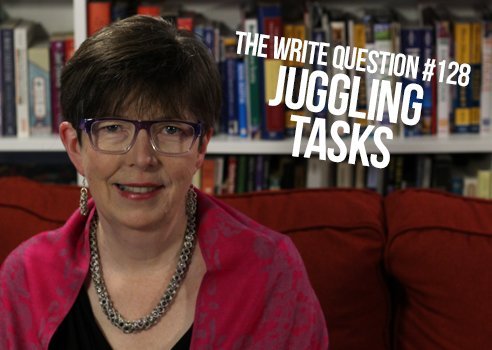Viewing time: 5 mins. 31 secs
The Write Question is a weekly video podcast about writing that I started in 2017 and that ran, more or less weekly, until April 2022. This is a republication of issue #128, which discusses how to juggle tasks related to book writing. The post first ran on Feb. 14/20.
Transcript:
Have you ever wondered about how to juggle tasks related to book writing? That’s the topic I’m addressing today in The Write Question. I’m Daphne Gray-Grant, the Publication Coach.
I have a question from April Clark, a writer based in Columbus, Georgia. Here’s what she asked by email….
“Do you have any tips on managing the administration of writing a book alongside the writing? I’m talking about such jobs as the marketing or research needed for a book. When should I do them and how much time should I allow for them?”
Thanks for your question, April. You know, there seems to be a general idea that ‘juggling’ is a valuable life skill. I think we put it in the same category as multitasking: We believe it’s a way of working that will help us become more productive and effective. Sadly, that’s not the least bit true.
In fact, we now know that multitasking actually makes us less productive and more distracted. I’m including a link to an article on that subject, below.
And I believe juggling tasks can have the same negative impact. I have long compared the process of writing a book to building a house. You don’t start putting up drywall, before the foundation is poured! And you don’t start painting walls until the windows are installed. With a house, these decisions seem obvious and straightforward. But with writing books, we’re often so eager to get ahead of ourselves.
Let me sketch out the order in which you should approach the tasks involved in writing a book:
- Thinking and planning
- Researching
- More thinking and planning
- Mindmapping
- Writing a Happy First Draft
- Incubating (leaving your draft to rest)
- Substantive editing
- Copy editing
- Proofreading
- Sales and marketing
Basically, you want to finish each of these jobs before you start the next one. You can’t write if you haven’t done the research first and you certainly don’t want to try. Nor can you edit a manuscript that doesn’t exist. Finally, you really can’t market a book that hasn’t been published yet.
The only possible exception relates to chapters in books. If you are exceptionally eager to begin writing, understand that it’s okay to go through steps 1-5 on a per chapter basis. This means that you don’t have to do the planning or the research for the entire book at once. Instead, you can do it one chapter at a time.
But that’s really the only exception.
Pay particular attention to ‘not editing’ while you are writing. The habit of editing-on-the-go will only slow your writing but will also make it much more painful for you. Instead of going through that misery, reduce the type size of what you are writing. Most of us write in 11 or 12 point. Instead, switch to 3 point. You’ll still be able to see that you’re accumulating words but you won’t be able to read them. And if you can’t read them, you can’t edit. I’m attaching a link, below, with even more tips on breaking the editing-while-you-write habit.
Another step that many people try to rush is the one I call incubation. You really do need to leave your manuscript sitting on your hard-drive, or in a drawer for a number of weeks — I recommend six — before you start editing. This is not wasted time or even “lazy” time. It’s necessary time, to give you the perspective you will need before you can start editing. Please check out my link below, titled “Become a better writer by incubating.”
If you’re able to take a step-by-step approach, April, I think you’ll find the writing process to be a lot more enjoyable. I also expect it will be faster, as well.
Finally, let me wrap up with a quote from American broadcaster Barbara Walters. “Most of us have trouble juggling. The woman who says she doesn’t is someone whom I admire but have never met.”
My last tip to you, April, is that you focus on putting all ideas relating to sales, marketing and potential readers totally out of your mind until you finish the first draft. Do just one thing at a time. When you write, write. When you edit, edit. When you market, market. You have nothing to gain by mooshing these three tasks together!
*
If you’d like to learn how to make writing a happier more fulfilling process for yourself please take a look at my latest book Your Happy First Draft. I don’t sell it in bookstores or via Amazon. The only place to buy it is on my website, link below.
Links
How Multitasking Affects Productivity and Brain Health
7 ways to stop editing while you write


